
Many marketers and business owners are always looking for ways to optimize two channels for traffic and conversions: Search Engine Optimization (SEO) and social media. In fact, there is a question that has been weighing on their minds for years: Does social media have an impact on SEO?
If the answer to that question is yes (and it’s pretty clear that it is, although the specifics remain a bit murky), a few more questions arise:
What kind of impact does social media have on SEO, and how much of an impact are we talking about?
How can you align your social media and SEO efforts to get the biggest bang for your buck?
We hear you — that’s why we decided to demystify the social-SEO connection by going straight to the experts for opinions on social media’s impact on SEO and the best strategies for using social media to boost SEO (and vice-versa). Check out what the pros have to say about:
- How Social Media Impacts SEO
- How to Use Social Media for an SEO Advantage
- How SEO and Social Media Work Hand-in-Hand
- How to Gain a Social Media Edge by Leveraging SEO
How Social Media Impacts SEO
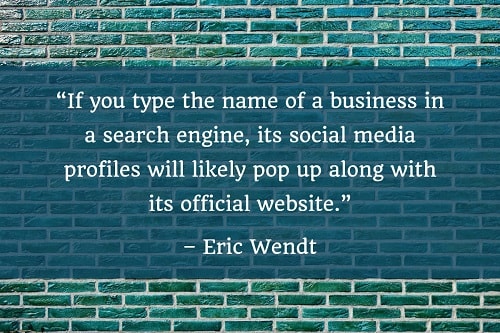 1. Social media profiles rank in search engines, too. “If you type the name of a business in a search engine, its social media profiles will likely pop up along with its official website.
1. Social media profiles rank in search engines, too. “If you type the name of a business in a search engine, its social media profiles will likely pop up along with its official website.
“If a company is able to rank not only for its website, but for its social profiles as well, then it will take up valuable real estate at the top of SERPs. This can help businesses beat out potential competitors in terms of visibility.
“TIP: Make sure all pertinent social profiles are active and consistently engaging with audiences. What’s most important is targeting the platforms that resonate most with your prospective customers.” – Eric Wendt, 6 Ways Social Media Impacts SEO, Brafton; Twitter: @Brafton
2. Social sharing can increase your inbound links. But remember that most social media platforms use no-follow links. “When someone discovers something on social media, there’s a chance they’ll share the link. Not only can this increase the number of inbound links to your site—improving your credibility—but it can also show how popular your content is as well. This can improve your rankings and you may also notice social media profiles showing up near the top of branded searches as well.” – Betsy McLeod, Does Social Media Affect SEO? Yes – Here’s How, Blue Corona; Twitter: @BlueCorona
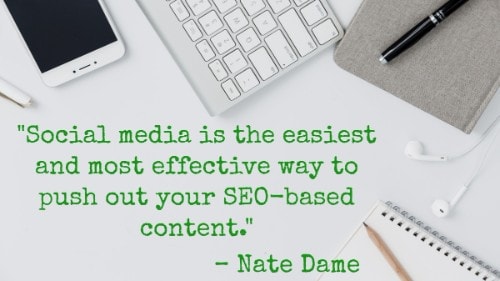 3. Social media can drive views and engagement. “Social media is the easiest and most effective way to push out your SEO-based content. While the incoming links from your social media shares don’t have the same impact of authentic links from high-quality sites, they can have an effect on your bounce rate and time-on-site engagement. If your content is good and people stick around to read it, those engagement metrics communicate value to search engines.
3. Social media can drive views and engagement. “Social media is the easiest and most effective way to push out your SEO-based content. While the incoming links from your social media shares don’t have the same impact of authentic links from high-quality sites, they can have an effect on your bounce rate and time-on-site engagement. If your content is good and people stick around to read it, those engagement metrics communicate value to search engines.
“Social media can also lead to authentic, high-quality links from influential websites. Influencers use social media as much as (or even more than) anyone else. With your content out there on the same channels they’re on, there’s a good chance they’ll see it and link to it from their own websites or blogs. That kind of high-value link building from influencer marketing can be difficult to land without social media.” – Nate Dame, Social Media and SEO: When and How They Work Together, Marketo; Twitter: @marketo
4. Facebook links are followed, so they can help more directly with rankings. “First, Google won’t count the shares or community size as a signal directly because it is way too easy to game the system.
“They will crawl Facebook pages, Twitter pages, etc., to see the content and links on the page though. Just like any other HTML page online.
“Now here is what is important.
“Links on Twitter are nofollow. So Google will not pass link juice through the pages, but they may use the links for indexing content.
“Links on Facebook are followed. So if Google sees a link shared on many Facebook pages, that they can crawl, that can help with rankings.” – How Social Media Really Affects SEO – Fact Driven Answers, Ignite Visibility; Twitter: @IgniteV
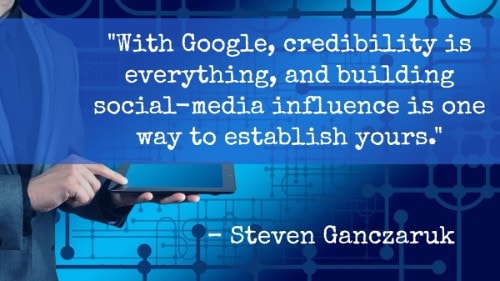 5. Tweets from high-influence users may impact search rankings. “With Google, credibility is everything, and building social-media influence is one way to establish yours. For instance, a high number of likes, shares, and followers on Facebook reveal a profile’s influence. How relevant your content is, how many people you reach with it, and whether the people engaging with you on social-media platforms have high influence themselves are all part of your authority.
5. Tweets from high-influence users may impact search rankings. “With Google, credibility is everything, and building social-media influence is one way to establish yours. For instance, a high number of likes, shares, and followers on Facebook reveal a profile’s influence. How relevant your content is, how many people you reach with it, and whether the people engaging with you on social-media platforms have high influence themselves are all part of your authority.
“Moz.com saw a spike in page rank after a link to their ‘Beginner’s Guide to SEO’ was tweeted out by a social-media profile with high influence and authority (Smashing magazine). Search-engine traffic increased for Moz.com, and they watched the page containing the keyword “beginner’s guide” catapult to number one on SERP (search engine results pages). Apparently, tweets from high-influence users can influence rankings for certain keywords.” – Steven Ganczaruk, Social and SEO: Can Social Media Performance Impact Ranking?, Adobe; Twitter: @Adobe
6. Search engine algorithms now incorporate social data to help sniff out “bad” links. “One of the challenges search engines like Google and Bing have always tried to overcome is understanding which external links exist solely for SEO purposes and which links represent a true indication that the source content is of value to the readers. Unfortunately, 95% of links from SEO link building never bring a single new visitor to your website.
“To help evaluate ‘bad links,’ search engine algorithms now incorporate social data – and they have for a while.” – Daniel Kushner, 5 Optimizations for Social Media to Improve SEO, Oktopost; Twitter: @Oktopost
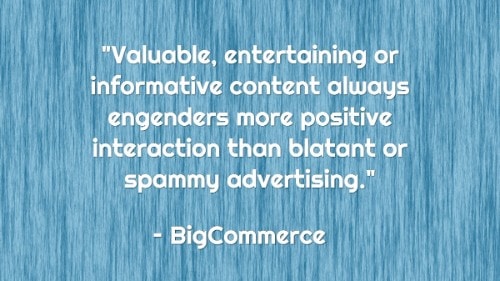 7. Social signals may even become more important to SEO over time. “Because so much sharing now takes place on major social media platforms, social signals may become as important to SEO as time on page, editorial linking, and content quality. For businesses looking to raise their search rankings, it indicates that a comprehensive social media strategy might be in order – in addition to all of the usual SEO tactics. In other words, strategies designed to increase social media engagement can also raise your website’s search engine ranking.
7. Social signals may even become more important to SEO over time. “Because so much sharing now takes place on major social media platforms, social signals may become as important to SEO as time on page, editorial linking, and content quality. For businesses looking to raise their search rankings, it indicates that a comprehensive social media strategy might be in order – in addition to all of the usual SEO tactics. In other words, strategies designed to increase social media engagement can also raise your website’s search engine ranking.
“First and foremost, strong content is key. Valuable, entertaining or informative content always engenders more positive interaction than blatant or spammy advertising. Some tried and true strategies for turning up the volume on your social signals are:
- Post daily: Keep your brand at the top of social media news feeds.
- Use images: Images greatly increase interaction rates for all social media types.
- Listen: Hear what people are saying about your brand and respond to critique in a constructive and positive way.
- Monitor: There are several free social media marketing apps which track shares, re-tweets, likes, and keywords associated with your brand.
- Contests: contests and giveaways are a great way to increase interest in your brand.
- Partnerships: Share links and produce original content with other popular brands.
- Cover all the social media bases: Produce content for all of the top social media sites.
“Social signals are yet another metric in the already complex and mysterious field of SEO. While the major search engines are black boxes, it’s inevitable that social media chatter has an effect on a website’s popularity. Increase social media engagement and your site may rise to the top of the ranks.” – What are social signals? How social media impacts SEO, BigCommerce; Twitter: @BigCommerce
How to Use Social Media for an SEO Advantage
8. Give your audience what they want to boost engagement. “Above all else, Facebook’s algorithm is designed to show people more of the stuff they like. That’s why it’s important to know what your audience wants and how to give it to them.
As Facebook reported: ‘Generally, we’ve found people find stories informative if they are related to their interests, if they engage people in broader discussions and if they contain news about the world around them. That could be anything from recipes, to local issues, to global current events.’
“To truly understand readers’ interests and behaviors, publishers need to A/B test their content. With ShareThis’ Social A/B tool, for instance, you can easily test different headlines, images, and copy against your audience. Just choose your piece, edit your variations, and launch the test. Once a winner is determined, post it to your page and see up to 75% lift in engagement.” – 4 ways to use Facebook’s algorithm to your advantage, ShareThis; Twitter: @ShareThis
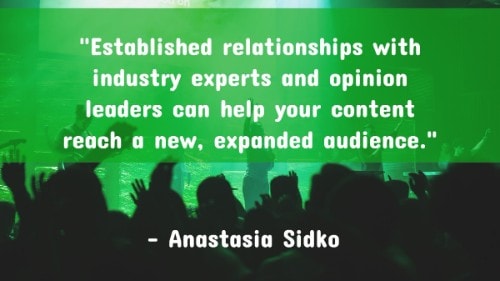 9. Conduct outreach to industry thought leaders and influencers to earn social links. “Established relationships with industry experts and opinion leaders can help your content reach a new, expanded audience.
9. Conduct outreach to industry thought leaders and influencers to earn social links. “Established relationships with industry experts and opinion leaders can help your content reach a new, expanded audience.
“Here are some tips for more efficient link building with social media:
- Make your content easy to share – ensure you’ve added social sharing buttons on your website. You can also add buttons for sharing specific types of content like videos, pictures, e-books, etc.
- If you’ve mentioned or quoted someone in a post, tag them when sharing it. That way, you’ll give them proper credit and make sure they see your content and probably share it with their own audience.
- Track mentions of your branded keywords and reach out to the authors to thank them and – if it is appropriate – to ask for a link.”
– Anastasia Sidko, How Social Media Affects SEO #SEOcafe, SEMRush; Twitter: @semrush
10. Increase your tweets and retweets to build your authority. “Increasing the tweet volume is straight forward – just tweet. What to tweet and when to tweet is an entirely different topic, but it is important to tweet. It’s my understanding that Google starts to pay attention to you (within an authority category) when you reach 5,000 tweets. If this is the case, then just keep tweeting. Be consistent, and tweet good content to your viewers.” – Gary Hyman, Optimizing Your Twitter Account to Boost your Google Rankings, GaryHyman.com; Twitter: @GaryHyman
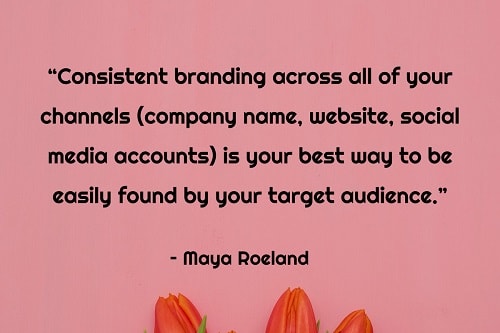 11. Use consistent branding across all your social channels. “Consistent branding across all of your channels (company name, website, social media accounts) is your best way to be easily found by your target audience. Your handle is also included in your unique Twitter URL.” – Maya Roeland, How to Use Google Search To Boost Your Twitter Presence, Social Media Week; Twitter: @socialmediaweek
11. Use consistent branding across all your social channels. “Consistent branding across all of your channels (company name, website, social media accounts) is your best way to be easily found by your target audience. Your handle is also included in your unique Twitter URL.” – Maya Roeland, How to Use Google Search To Boost Your Twitter Presence, Social Media Week; Twitter: @socialmediaweek
12. Building an audience on social media helps you meet people where they are. “You can have the best product or service out there, but if people don’t know about it, you can give it up. ‘Build it and they will come’ doesn’t cut it in today’s competitive marketplace. You have to be proactive and reach people where they are.
“And where are the majority of people? Social media. In fact, Facebook has nearly 2 billion users.
“With the number of people on social media, its worldwide reach, and its ease of sharing, social media is a great way to build your web presence and quickly build an audience. If you want to be found among the millions of sites on the web (and the 571 new websites being created each minute), you’re going to have to up your social game.
“We also know that click-through rates can impact search engine rankings. Social media marketing helps build brand awareness and an audience, which increases the likelihood that people will click on your brand’s content in Google’s search results.” – Ron Dod, How Social Media Helps SEO [Final Answer], Search Engine Journal; Twitter: @sejournal
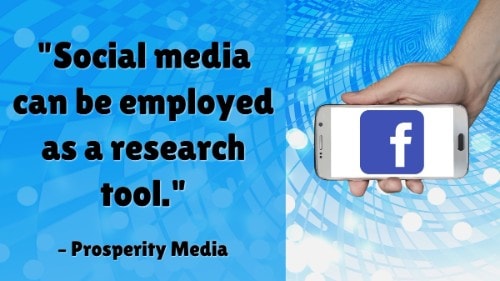 13. You can even leverage social media to gather intel about your target audience. “Having your market laid out across the internet makes it a lot easier to gather information and understand how major players are operating as well as which way trends are shifting.
13. You can even leverage social media to gather intel about your target audience. “Having your market laid out across the internet makes it a lot easier to gather information and understand how major players are operating as well as which way trends are shifting.
“Social media can be employed as a research tool. You can analyze the demographics of your followers and gather data about how consumers interact with your digital content. The constant real-time feedback allows you to optimize your content to meet consumer expectations. There are numerous internal and external tools such as Facebook’s Audience Insights and sites like SocialBlade.com, which you can use to learn more about your customers as well as your competitors which will allow you to create more effective marketing material.” – 7 Benefits of Social Media Marketing in 2019, Prosperity Media; Twitter: @mediaprosperity
14. Share content on social media to help Google find it faster. “When you publish a page online, Google doesn’t see it right away. This means that it isn’t ranking in the search results.
“Links from social media allows Google to see your page faster and getting it ranked.” – Roy McClean, How Social Media Impacts SEO, Custom Fit Online; Twitter: @CustomFitOnline
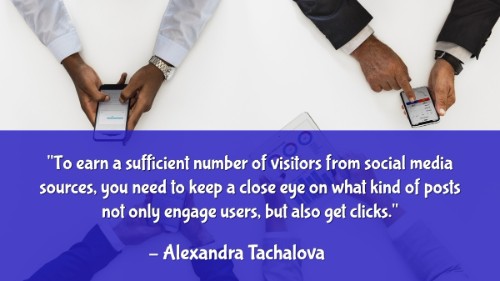 15. Keep an eye on the types of posts that engage users and get clicks. “From examining my own clients’ Twitter and Facebook analytics insights, it’s clear that users are more likely to like or share content rather than click on it. To earn a sufficient number of visitors from social media sources, you need to keep a close eye on what kind of posts not only engage users, but also get clicks. And if your goal is to drive traffic, then you need to focus on writing engaging tweets that will make your followers want to click on them. At the very least, you have to make sure that you actually include a link in your post. Because — let’s face it — we’ve all forgotten to share a link in our tweet at least once.” – Alexandra Tachalova, The Battle for Traffic: Organic SEO vs. Social Media Marketing, Moz.com; Twitter: @Moz
15. Keep an eye on the types of posts that engage users and get clicks. “From examining my own clients’ Twitter and Facebook analytics insights, it’s clear that users are more likely to like or share content rather than click on it. To earn a sufficient number of visitors from social media sources, you need to keep a close eye on what kind of posts not only engage users, but also get clicks. And if your goal is to drive traffic, then you need to focus on writing engaging tweets that will make your followers want to click on them. At the very least, you have to make sure that you actually include a link in your post. Because — let’s face it — we’ve all forgotten to share a link in our tweet at least once.” – Alexandra Tachalova, The Battle for Traffic: Organic SEO vs. Social Media Marketing, Moz.com; Twitter: @Moz
16. Spend some time on Google+. “This one is pretty obvious: Google factors in your presence on Google+. Take 10 minutes each day to spend on your brand’s Google+ page, whether it’s to post something on your business profile, or posting your content into Google+ communities. Be sure to post the content you want to be ranking for on Google+ to prove to Google that you are worthy of positioning high in their search engine.” – Kristina Cisnero, Why Content Marketing And Social Media Are Your Most Powerful SEO Weapons, HootSuite; Twitter: @hootsuite
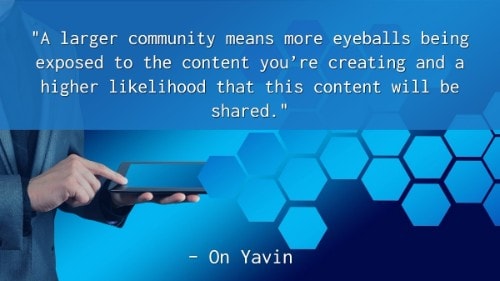 17. Cultivate a robust social media community to increase shares and engagement. “A larger community means more eyeballs being exposed to the content you’re creating and a higher likelihood that this content will be shared. This increases the number of backlinks leading to your site which will help with your ranking.
17. Cultivate a robust social media community to increase shares and engagement. “A larger community means more eyeballs being exposed to the content you’re creating and a higher likelihood that this content will be shared. This increases the number of backlinks leading to your site which will help with your ranking.
“Also, the more engagement you have around your social media activity, the more likely people are to search for your brand on Google via branded searches. Branded searches can help your site get ranked for non-branded keywords that are related to your brand and the service or product it offers.
“Keep in mind, this whole premise is based on the notion that you are distributing content of the highest quality. If you are publishing mediocre material that has no value, you are shooting yourself in the foot. Users will have no incentive to interact with you if you don’t offer some sort of interesting and entertaining information. If you want people to share the content you are creating, invest time and effort into developing materials that will actually attract readers.” – On Yavin, Social Media’s Impact on SEO, Social Media Explorer; Twitter: @on_yavin, @smxplorer
18. Focus on gaining references from accounts with good reputations. “Just as search engines don’t count all links equally, they don’t view all social accounts as being the same. This makes sense, since anyone can create a new account on a social network. What’s to prevent someone from making 100 different accounts to manufacture fake buzz?
“Nothing, really, other than the fact that fake accounts like these can often be easy to spot. They may only have a handful of ‘quality’ friends in their network, and few might pass along material they share.
“Ideally, you want to gain references from social accounts with good reputations. Having your own social presence that is well regarded is important. So participate on relevant social platforms in a real, authentic way, just as you would with your website, or with customers in an offline setting.” – Chapter 8: Social media & ranking in search results, Search Engine Land; Twitter: @sengineland
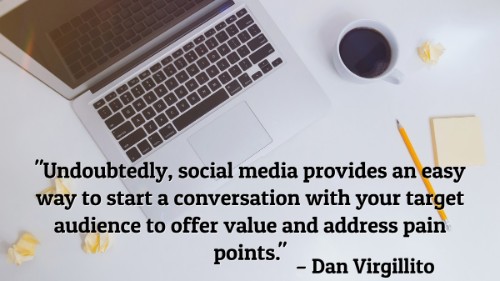 19. Strike up conversations with your social media followers – it matters! “Undoubtedly, social media provides an easy way to start a conversation with your target audience to offer value and address pain points. Launch inquiries, post useful tips, start a general discussion and reply to the audiences’ comments with helpful tips.
19. Strike up conversations with your social media followers – it matters! “Undoubtedly, social media provides an easy way to start a conversation with your target audience to offer value and address pain points. Launch inquiries, post useful tips, start a general discussion and reply to the audiences’ comments with helpful tips.
“Then, engage people in the conversation directly. Such engagements are key to creating and retaining an interactive community. Social media SEO would encourage your existing customers to return while helping you develop authority for potential ones. Not to mention, a satisfied audience would be willing to spread the word about your company.
“When implementing this tactic, you can also capitalize on the immediacy of response, which 72% of customers listed as critical. Fast response will increase the willingness of people to recommend or praise your brand on social media.
“Indirectly, it will result in SEO gains when someone mentions your name on their blog as a helpful resource.” – Dan Virgillito, 4 Ways to Use Social Media SEO to Improve Your Search Engine Visibility, Elegant Themes; Twitter: @elegantthemes
20. Use share buttons to encourage readers to share your content, but place them strategically for the biggest impact. “You need to select which share buttons you display and the order you display them based on your audience. It’s easier to encourage sharing behaviors on the websites, communities, forums, and social networks that your audience is already using.
“It doesn’t matter whether or not your brand has an active marketing presence on the site — the key for driving reader engagement and sharing is focusing on where your audience hangs out.
“Displaying buttons for sites your audience doesn’t use can have a negative impact on your site and engagement in many ways:
- The more buttons you display, the more you risk a ‘paradox of choice’ situation for the reader: they will have a hard time deciding which one to click, so they don’t click or share anywhere.
- More buttons add clutter: Adding buttons that won’t be used just creates clutter and pulls design focus from those that readers might want to use.
- The wrong buttons can provide negative social proof: If you’re displaying share counts as well as using buttons for sites that go unused, the low share count can actually dissuade people from sharing.
“Aside from excluding buttons that your audience doesn’t use, you’ll also want to make sure the ones they use most are the first ones displayed. For most publishers, Facebook and Twitter definitely need to be placed front and center. Also, look at your referral traffic to see which networks and forums are driving a lot of traffic to your site.” – How to strategically use share buttons to increase engagement and SEO, ShareThis; Twitter: @ShareThis
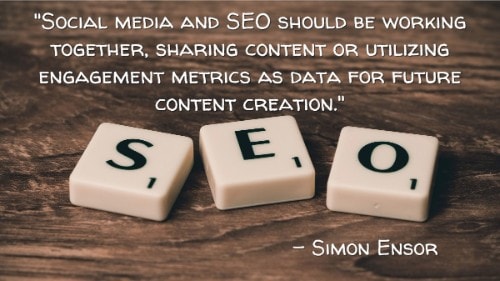 21. Don’t get too hung up on the SEO benefits. Social media has its own perks aside from SEO value. “Whether or not Google or Bing count social metrics as direct ranking factors is somewhat of a moot point. Social media and SEO should be working together, sharing content or utilizing engagement metrics as data for future content creation.
21. Don’t get too hung up on the SEO benefits. Social media has its own perks aside from SEO value. “Whether or not Google or Bing count social metrics as direct ranking factors is somewhat of a moot point. Social media and SEO should be working together, sharing content or utilizing engagement metrics as data for future content creation.
“Lest we forget, businesses can benefit from revenue generated directly from social media regardless of its influence on search rankings. Social media campaigns should be focused primarily on generating their own success, with SEO considerations as a secondary (but still important) consideration.” – Simon Ensor, What are the SEO benefits of social media?, Search Engine Watch; Twitter: @sewatch
22. Use social media to boost local SEO. “Social networks can be difficult to integrate into a local brand SEO strategy. However, with careful thought, you might find an interesting and engaging way to use such platforms to further your conversion goals.
“Keep in mind that new social networks turn over quickly, as most have an inherently short life cycle. Yet this natural ebb and flow allows for immense opportunity in local branding. When new networks arise with unique capabilities, be the first company locally and within your industry to capitalize on the excitement of a new digital service.
“By discovering and exploring these opportunities, you may find an entirely new audience that had previously gone unrealized.” – Lydia Jorden, Leveraging social media for local SEO, Search Engine Land; Twitter: @sengineland
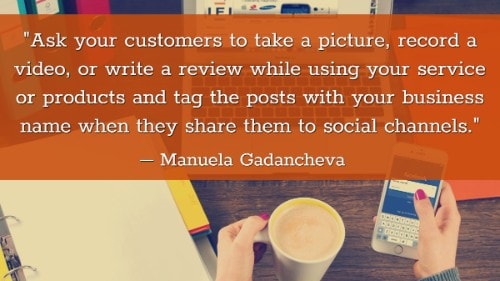 23. Leverage user-generated content to your advantage. “Ask your customers to take a picture, record a video, or write a review while using your service or products and tag the posts with your business name when they share them to social channels. Then pull the tagged user-generated content and utilize it for your site. Regarding the SEO and the website traffic, users’ comments and reviews can be a source of long-tail search queries including color variations, sizes, models, or specific uses. Although, long-tail keywords will drive less traffic to your site in comparison to generic terms, the traffic will be more focused and visitors might be more interested in your products and services. Moreover, long-tail and geo-targeted keywords offer local businesses better chances for getting first page rankings.” – Manuela Gadancheva, 9 Tips to Boost Your Local SEO with Social Media, OptiLocal; Twitter: @OptiLocal
23. Leverage user-generated content to your advantage. “Ask your customers to take a picture, record a video, or write a review while using your service or products and tag the posts with your business name when they share them to social channels. Then pull the tagged user-generated content and utilize it for your site. Regarding the SEO and the website traffic, users’ comments and reviews can be a source of long-tail search queries including color variations, sizes, models, or specific uses. Although, long-tail keywords will drive less traffic to your site in comparison to generic terms, the traffic will be more focused and visitors might be more interested in your products and services. Moreover, long-tail and geo-targeted keywords offer local businesses better chances for getting first page rankings.” – Manuela Gadancheva, 9 Tips to Boost Your Local SEO with Social Media, OptiLocal; Twitter: @OptiLocal
24. Don’t forget your #hashtags. “Make sure you are using hashtags that people are searching for. It’s not helpful to use a really clever hashtag if no one is searching for it.
“When searching, use the native search box within the social platform. Or you can use a program such as Hashtag.org.
“Make sure that you have an understanding of the proper use of hashtags on the platform that you are posting on. Different platforms have different rules.” – Kim Starry, The Why’s and How-To’s: Using Social Media to Boost SEO, Rocks Digital; Twitter: @RocksDigital
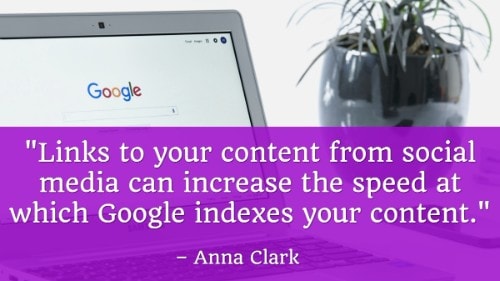 25. Share your content across your social channels to improve findability and boost interaction. “Links to your content from social media can increase the speed at which Google indexes your content. That is, if you share a post right away, it can show up in search engines much faster than when it isn’t shared at all.
25. Share your content across your social channels to improve findability and boost interaction. “Links to your content from social media can increase the speed at which Google indexes your content. That is, if you share a post right away, it can show up in search engines much faster than when it isn’t shared at all.
“Sharing content has the obvious benefit of bringing traffic into your website. When a page has a lot of traffic, Google can see it. The traffic shows that the content is valuable, and helps to push that particular page further to the top of search engine results.
“Ongoing interaction with a particular post on social media can help to extend the ranking ability of the targeted web page.” – Anna Clark, How to Use Social Media for SEO, Realize Online; Twitter: @Realize_Online
How SEO and Social Media Work Hand-in-Hand
26. The effort you spend on SEO can boost your social media reach. “Social media marketing and SEO are two tightly-interwoven strategies. Both are organic, inbound strategies that focus on building an appealing identity that naturally attracts visitors. Since social media relies on high-quality content and a visible, strong brand presence, the efforts you spend on SEO can doubly improve your social media reach, and as most search marketers will tell you, your social media presence can greatly increase your search rankings.” – Mark Toney, How Social Media Supports SEO for Increased Engagement, Traffic and Sales, Rocks Digital; Twitter: @RocksDigital
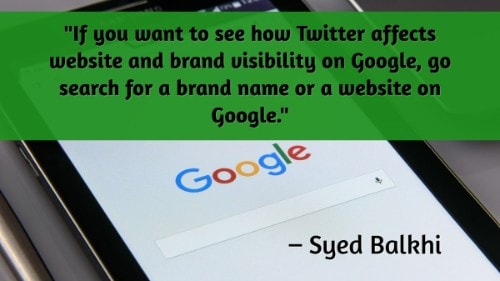 27. Twitter is especially prominent in Google’s SERPs. “If you want to see how Twitter affects website and brand visibility on Google, go search for a brand name or a website on Google.
27. Twitter is especially prominent in Google’s SERPs. “If you want to see how Twitter affects website and brand visibility on Google, go search for a brand name or a website on Google.
“You’ll see the Twitter stream of that particular brand pop up on the main page of search results showing the latest tweets from that page.
“You can also try searching for a hashtag on Google. Many people search hashtags on Google to discover content on social media. Guess which platform always comes on top when you search for a hashtag on Google?” – Syed Balkhi, 3 Ways to Use Twitter to Increase Search Rankings, Entrepreneur; Twitter: @syedbalkhi
28. Getting your social media profiles to rank helps you dominate the SERPs (particularly for brand searches). “The ideal scenario is to have your website and social profiles dominate the first page of your branded SERPs. This is great because it’s all assets that you own, which will help you control what searchers see and your brand perception.
“Google announced recently that they will be inserting Tweets into Web search, so this is another opportunity to layer social into your branded Web searches.” – Tony Edward, Social Profile SEO: Optimizing For Rankings & Search Visibility, Search Engine Land; Twitter: @TonyENYC, @sengineland
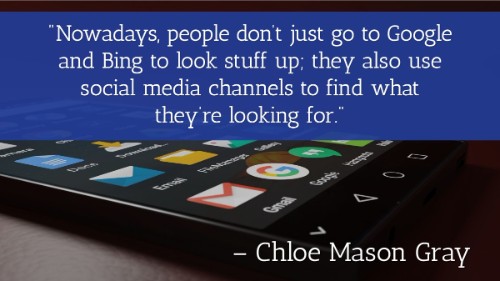 29. People also use social media platforms as search engines. “Nowadays, people don’t just go to Google and Bing to look stuff up; they also use social media channels to find what they’re looking for. Patel makes this point in his article on why social is the new SEO: ‘We need to understand that search engine optimization includes the search that happens on social media search engines.’
29. People also use social media platforms as search engines. “Nowadays, people don’t just go to Google and Bing to look stuff up; they also use social media channels to find what they’re looking for. Patel makes this point in his article on why social is the new SEO: ‘We need to understand that search engine optimization includes the search that happens on social media search engines.’
“This works in a couple of ways: First, if you’re active on Twitter, it’s entirely possible that people will discover your company’s new content distribution app after searching for content marketing-related tweets with Twitter’s search engine. Likewise, brands that lend themselves to beautiful visual content can benefit from making their content visible in Pinterest and Instagram by using hashtags and properly categorizing their pins.” – Chloe Mason Gray, 5 Things You Need to Know About Social Media & SEO, Kissmetrics; Twitter: @Kissmetrics
30. “Social SEO” isn’t a separate branch of SEO, but it is an important strategy consideration. “You can get good rankings by paying no attention at all to social SEO, but you can’t rank your business’s website through social SEO alone. So, why bother with social SEO then, if it’s not essential? Because positive social activity around your website makes it easier/faster to rank your site in search engines – directly through the authority that search engines give to Likes, Tweets, and Google +1s, and indirectly through exposing your content to a wider audience, some of whom will link to it from their own sites.
“Social SEO isn’t a separate branch of SEO and it won’t soon be replacing traditional SEO, but social signals are becoming increasingly integrated into search engine algorithms. Social signals aren’t as important as backlinks, and they won’t be for a long time, if at all. But backlinks aside, social signals are about as important as anything else. Over the course of the last year or two, the question is no longer ‘do social signals have an effect on website rankings?” but rather “how much of an effect are they having?’.
“No one knows for sure exactly how much of a factor social activity is in determining where your website ranks for your targeted keywords, as no search engine has made public that information, however, there’s no denying that it’s a relevant factor that does affect where your website ranks. The importance of social SEO has been steadily increasing and is highly likely to continue increasing in importance too.” – Steve Napier, What Is Social SEO?, SEOmark
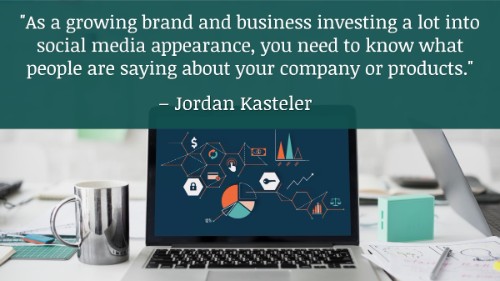 31. SEO data can inform a smart social media strategy. “As a growing brand and business investing a lot into social media appearance, you need to know what people are saying about your company or products. To find that out, you can use different monitoring tools such as Mention or Google Alerts. However, to set the alerts correctly, you need to understand which search terms are being used.
31. SEO data can inform a smart social media strategy. “As a growing brand and business investing a lot into social media appearance, you need to know what people are saying about your company or products. To find that out, you can use different monitoring tools such as Mention or Google Alerts. However, to set the alerts correctly, you need to understand which search terms are being used.
“This is where SEO gets into the game. It’s important to determine the most frequent search queries related to your niche. This data helps interpret the social community’s most urgent concerns.
“Often, the best insights come from discussions about your niche overall, but not a specific product. In other words, you need to search for the keywords you want to target in organic and paid search and use them to track social media awareness.
“As soon as you discover these keywords, you can set alerts or manually do a daily search on various social networks like Twitter, Facebook and so on.” – Jordan Kasteler, How to use SEO data in your social media strategy, Marketing Land; Twitter: @Marketingland
32. Both SEO and social media are about gaining authority. “SEO and social media are both about gaining authority. Most of the top sites that rank highly in competitive industries are the ones that are seen as authorities. The top brands on social media are authorities and the top people in their niche.” – Dominique Jackson, SEO Tips for Social Media Managers, Sprout Social; Twitter: @djthewriter
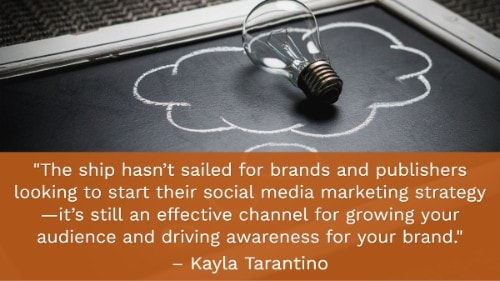 33. With social media platforms like Facebook diminishing visibility of companies and brands, SEO (as well as paid promotion) is becoming critically important for driving traffic to your social channels. “With Mark Zuckerberg stating that users will be seeing ‘less public content like posts from businesses, brands, and media’ in their organic newsfeeds, we expect other major players may follow suit with their own algorithm changes. Social media will, in fact, be social again.
33. With social media platforms like Facebook diminishing visibility of companies and brands, SEO (as well as paid promotion) is becoming critically important for driving traffic to your social channels. “With Mark Zuckerberg stating that users will be seeing ‘less public content like posts from businesses, brands, and media’ in their organic newsfeeds, we expect other major players may follow suit with their own algorithm changes. Social media will, in fact, be social again.
“While visibility for publishers and brands will decrease organically (as it has been for some time already), this trend puts extra emphasis on the importance of having a paid strategy for promoting your content on social media.
“The ship hasn’t sailed for brands and publishers looking to start their social media marketing strategy —it’s still an effective channel for growing your audience and driving awareness for your brand.” – Kayla Tarantino, Social Media Trends to Watch in 2018, Investis Digital; Twitter: @InvestisDigital
34. Applying SEO practices (like keyword optimization) to social media increases discoverability when users search social platforms like Facebook and YouTube. “Blog posts, guides, whitepapers, case studies, videos, and social posts all need to include the right keywords for social and SEO. SEO is not just Google. Search is everywhere on the web. Social media platforms are becoming just as big in search. YouTube is the second largest search engine after Google. Like Google, it indexes content and provide search results based on your search queries.
“Similarly, Facebook is a search engine that indexes user-generated content e.g. social media posts, conversations, and news feeds. Because of this, you are able to search any topic and Facebook will get results based on what is on the web and the discussions around it.
“Adding relevant keywords to your content increases the likelihood that your social content is visible on both search engines and on social media platforms. Make it a habit to incorporate relevant keywords as much as possible.” – Kevin Tran, Social Media and SEO: 5 Quick Wins to Increase Your Reach, Hootsuite; Twitter: @Hootsuite
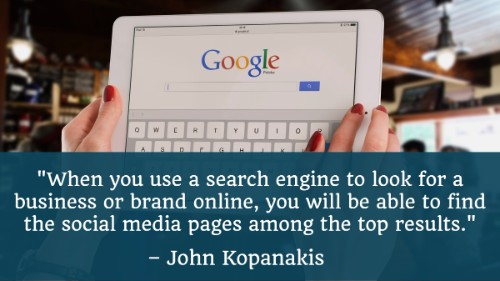 35. Many people will actually visit a brand’s social media profile before visiting the company website, so social media profiles that rank in the SERPs are a major advantage. “When you use a search engine to look for a business or brand online, you will be able to find the social media pages among the top results. Social channels are more personal than websites and most consumers will prefer visiting your social media profile before they visit your website to get a better sense of the brand’s personality.” – John Kopanakis,
35. Many people will actually visit a brand’s social media profile before visiting the company website, so social media profiles that rank in the SERPs are a major advantage. “When you use a search engine to look for a business or brand online, you will be able to find the social media pages among the top results. Social channels are more personal than websites and most consumers will prefer visiting your social media profile before they visit your website to get a better sense of the brand’s personality.” – John Kopanakis,
Top 10 Social Media Platforms That Are Best For Increasing SEO, Mentionlytics; Twitter: @mentionlytics
How to Gain a Social Media Edge by Leveraging SEO
36. Integrate social into your website. “Social sharing tools should be integrated in your site architecture. Include direct web links to your social media channels from your website and from your social profiles back to your website. You can also add social media buttons to individual blog posts.
“Links on social media are often considered higher-quality links because social sites have a high web authority. Even if your Facebook page is brand new, it’s likely to rank well in the SERPs because of Facebook’s overall high authority.” – Raquelle Dickerson, 7 Tips for Social Media Optimization, SEO.com; Twitter: @seocom
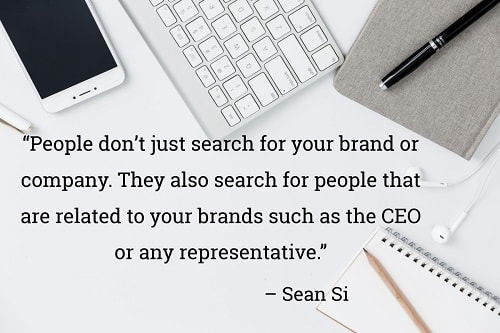 37. Make all essential info about your brand readily available on your social media profiles. “People don’t just search for your brand or company. They also search for people that are related to your brands such as the CEO or any representative. Which would entail that if any user searches for a person in any search engine, the top results would be that specific person’s social media profiles.
37. Make all essential info about your brand readily available on your social media profiles. “People don’t just search for your brand or company. They also search for people that are related to your brands such as the CEO or any representative. Which would entail that if any user searches for a person in any search engine, the top results would be that specific person’s social media profiles.
“Basically, all your social media profiles should possess the necessary information any user wants to know, from your position to what you can do for them. If there is a chance that a user happens to find your social profile, and it does not contain any information that is beneficial to them, then there is a high chance that they will opt to go for your competitor just because they have the necessary information on their social profiles.
“This is the same for your business. All the information that the users need to know should be on your company’s social profiles.” – Sean Si, Ranking Better by NOT Focusing on Social Media, SEO Hacker; Twitter: @SEO_Hacker
38. Optimize your social media copy with keywords. “From a single hashtagged post, a follower might find your profile, more of your similar content, and click through directly to your website. Use carefully selected keywords in your posts, links, and hashtags to help elevate your rank in social search results and add to the visibility of your brand.” – John Jantsch, 7 Ways to Improve Your Search Rank With Social Media, Social Media Examiner; Twitter: @SMExaminer
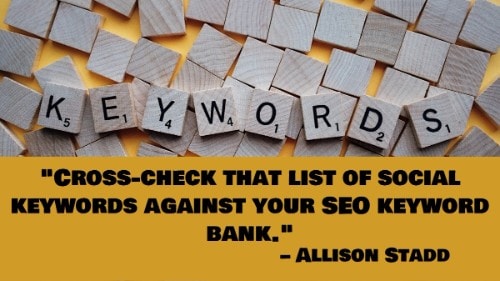 39. Make sure your social and SEO keywords are in sync. “Cross-check that list of social keywords against your SEO keyword bank. Then leverage the resulting duplicate keywords across all your marketing channels — from your Facebook page ‘about’ section and LinkedIn company page description to press release headlines and Slideshare deck titles — and you’ve just doubled, at minimum, the targeted strength of your outreach. Make sure to implement the dually-aligned keyword practice not just for static digital content, but also daily social updates. That is, for every new piece of content you push out via social media, from blog posts to white papers to infographics, align the keywords you use in tweets, Facebook posts, pin captions, and the like with the keywords you’ve optimized those web pages for. For example, if you published a blog post about tracking Twitter trends, use the phrase ‘Twitter trends’ in the tweets, Facebook posts, Google+ posts, and the like that you use to promote the post.” – Allison Stadd, How to Integrate Your SEO and Social Media Strategies, Intechnic; Twitter: @intechnic
39. Make sure your social and SEO keywords are in sync. “Cross-check that list of social keywords against your SEO keyword bank. Then leverage the resulting duplicate keywords across all your marketing channels — from your Facebook page ‘about’ section and LinkedIn company page description to press release headlines and Slideshare deck titles — and you’ve just doubled, at minimum, the targeted strength of your outreach. Make sure to implement the dually-aligned keyword practice not just for static digital content, but also daily social updates. That is, for every new piece of content you push out via social media, from blog posts to white papers to infographics, align the keywords you use in tweets, Facebook posts, pin captions, and the like with the keywords you’ve optimized those web pages for. For example, if you published a blog post about tracking Twitter trends, use the phrase ‘Twitter trends’ in the tweets, Facebook posts, Google+ posts, and the like that you use to promote the post.” – Allison Stadd, How to Integrate Your SEO and Social Media Strategies, Intechnic; Twitter: @intechnic
40. Nurture your social media presence the same way you do your search presence. “No longer can we view the algorithm as a sterile and lifeless entity to be gamed, tricked, and cajoled by our clever SEO tricks. We must now realize the enormous impact of the social web.
“The web is comprised not merely of bits and bytes but of people, organizations, groups, causes, ideas, and human energy. We’ve observed that with Apple’s popularization of speech search (e.g., Siri) and Google’s Hummingbird update, even the style and syntax of search has a human, or conversational, element.
“As we move forward in the new SEO era of social, the takeaway is this — stay active on your social networks. Pay attention to them, curate them, improve them, enhance them, and remain plugged into this valuable resource.” – Neil Patel, Why Social Is the New SEO, QuickSprout; Twitter: @neilpatel
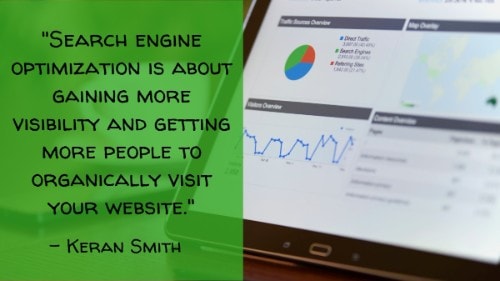 41. An effective social media strategy needs a solid SEO plan. “Search engine optimization is about gaining more visibility and getting more people to organically visit your website. Social media marketing on the other hand, is about making the most of social networks and getting found by the right people. They both might look different but have overlapping goals. In essence, they work together. This is why search engines are becoming more social, and social networks are turning into valuable search engines.
41. An effective social media strategy needs a solid SEO plan. “Search engine optimization is about gaining more visibility and getting more people to organically visit your website. Social media marketing on the other hand, is about making the most of social networks and getting found by the right people. They both might look different but have overlapping goals. In essence, they work together. This is why search engines are becoming more social, and social networks are turning into valuable search engines.
“An effective social media strategy has to have a solid SEO plan in place, because both of them go hand and in hand.” – Keran Smith, Social Media SEO: What You Need to Know to Grow Your Business, Lyfe; Twitter: @LYFEMarketing
42. Make smart use of social media meta tags. “Social media meta tags or social tags are HTML tags that start with the word ‘meta.’ You put these tags in your page’s code to help determine what information appears in Twitter, Facebook, Pinterest, etc., when people share your URL.
“When you set up meta tags, your social shares get noticed and shared more.” – Marcia Riefer Johnston, 5 SEO Strategies for Social Media You Need to Know Before You Hit Publish, Content Marketing Institute; Twitter: @CMIContent
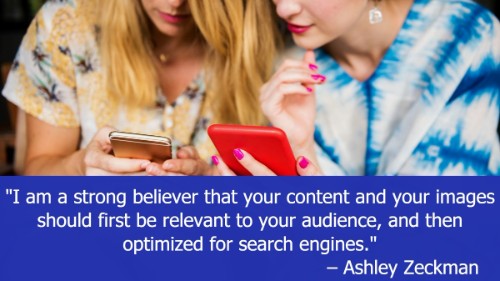 43. Use inspiring images and optimize them for search. “I am a strong believer that your content and your images should first be relevant to your audience, and then optimized for search engines. A good example of news images that have received a lot of social sharing are collections of compelling photos. This group of the most powerful photos of 2011 on BuzzFeed has receive over 45,000 Tweets and 862,000 likes on Facebook.” – Ashley Zeckman, 3 Ways to Optimize Images: Search, Social Media & User Experience, TopRank Marketing; Twitter: @toprank
43. Use inspiring images and optimize them for search. “I am a strong believer that your content and your images should first be relevant to your audience, and then optimized for search engines. A good example of news images that have received a lot of social sharing are collections of compelling photos. This group of the most powerful photos of 2011 on BuzzFeed has receive over 45,000 Tweets and 862,000 likes on Facebook.” – Ashley Zeckman, 3 Ways to Optimize Images: Search, Social Media & User Experience, TopRank Marketing; Twitter: @toprank
44. Give your social media profiles an SEO boost. “Almost everybody has a social media profile either on Facebook, Twitter, or Google+. Besides getting social and having fun, your social media profiles can positively affect your SEO efforts. The benefit is either direct i.e. more people can find your profile so more people will connect with you and visit your web site or indirect i.e. it’s an extra link pointing to your website from your profile.
“In addition, don’t forget that all social media platforms have their own internal search engine (for example Facebook Graph Search) which is based on the information provided in your profile. So if you have a well-defined profile more people will find you searching within Facebook, Twitter, Google+ or Pinterest.” – Alex Chris, SEO boost your social media profiles, ReliableSoft.net; Twitter: @ReliablesoftNet
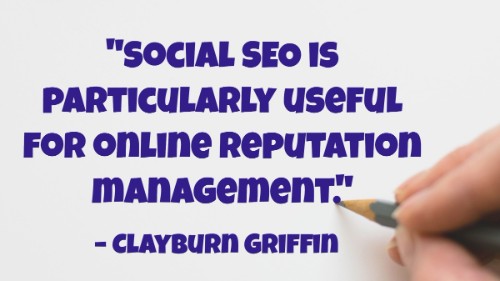 45. Use Google Analytics to measure social SEO factors like the number of owned and positive results. “Social SEO is particularly useful for online reputation management. You can use social media to promote and improve the position of positive content and keep negative results down, should any exist.
45. Use Google Analytics to measure social SEO factors like the number of owned and positive results. “Social SEO is particularly useful for online reputation management. You can use social media to promote and improve the position of positive content and keep negative results down, should any exist.
“To measure this one, decide on your keywords to watch. This will typically involve your brand name and high level variations such as ‘brand name videos’ or ‘brand name twitter.’ You may have good reasons to throw in some non-branded keywords, but this list will generally be more focused than an overall keyword strategy.
“A web search for these terms should return owned results, such as your website, your Twitter, Facebook, Pinterest, etc., along with positive and neutral results.
“Track the number of owned and positive results on the first page or two of search engines once a week and chart progress. This metric should change significantly – say, from 2/20 to 15/20, over the course of an effective social SEO campaign.
“Don’t forget that image and video search are important here, too.” – Clayburn Griffin, How to measure and report social SEO metrics, Raven; Twitter: @RavenTools
46. Use SEO practices to optimize your social media posts. “To optimize your social content, always include some of the relevant search keywords you determined for your business in your Facebook updates, tweets, pin descriptions, etc. It’s important to remember to share content from your website or blog socially to give it an SEO boost too. Sharing new content on Twitter is especially important because it helps Google index it faster (indexing means Google adds this URL to their database).
“Insider Tip: Use your business’s name in your social posts. This helps Google associate the keywords you use to describe your business with your business’s name.” – Danielle Cormier, 6 Uncomplicated Social SEO Tips for Small Businesses, Constant Contact; Twitter: @ConstantContact
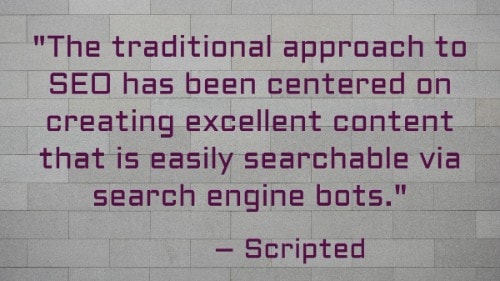 47. When creating SEO content, keep the social layer in mind. “The traditional approach to SEO has been centered on creating excellent content that is easily searchable via search engine bots. To be clear, this approach is still perfectly valid.
47. When creating SEO content, keep the social layer in mind. “The traditional approach to SEO has been centered on creating excellent content that is easily searchable via search engine bots. To be clear, this approach is still perfectly valid.
“The main difference now is that there is a social layer to this type of SEO-friendly content development. In addition to being high-quality, your web content must be sharable. Factors like your brand’s connections with other social media users and how many people ‘like’ or ‘+1’ your posts also influence search engine rankings. The key here is to not focus on a content strategy or purely on a social strategy, but to align social media efforts with content.” – Facebook, Twitter & More: Which Social Platform Affects Your SEO?, Scripted; Twitter: @getscripted
48. Create assets to complement social media campaigns just like you create assets specifically for SEO and other purposes (think landing pages and similar assets). “You can significantly upgrade your social media marketing returns by creating assets specifically designed to complement social posts.
“For instance, you can create a lead-capturing landing page for specific target segments to use with targeted promoted social media posts. That way, your call-to-action can take 18-year-old college students to a different page with different appeals than your page aiming to convert 70-year-old retirees.
“You can also create assets that you know will perform well on social, such as infographics. Infographics get around 41.5% engagement, on average, making them the content with the second-best ROI behind video.
“Developing assets like these help connect your social media presence to customer actions that actually generate revenue. They also ensure you have a best-fit destination for each outgoing click to your website, as opposed to shoehorning a single “contact us” page link into every post or something similar. Since each asset is custom-made for social, they’re better suited to their individual purpose.” – 5 Ways to Revamp Your Social Media Strategy in 2018, Get Found Fast; Twitter: @Get_Found_Fast
 49. Optimize your social media posts for searches. “This strategy also relies upon pre-existing content, but it opens a secondary channel for search. In addition to news articles and Knowledge Graph entries, Google also tends to favor popular social media updates in the top sections of its SERPs. It’s a key, somewhat temporary position you can attain by making sure your posts are optimized for the opportunity.
49. Optimize your social media posts for searches. “This strategy also relies upon pre-existing content, but it opens a secondary channel for search. In addition to news articles and Knowledge Graph entries, Google also tends to favor popular social media updates in the top sections of its SERPs. It’s a key, somewhat temporary position you can attain by making sure your posts are optimized for the opportunity.
“First, you’re going to need a strong anchor for your post. That can be a video, an infographic, or even a link to a full-detailed article. Whatever it is, it’s going to serve as your foundation, and you’ll need to title it in an accurate, descriptive way. Next, when you post it, frame your foundation with text that’s optimized for a specific type of search. For example, if you’ve written a detailed article on best practices for making oatmeal cookies, you could frame it with a specific query like ‘Have you ever wondered how to make the perfect oatmeal cookie?’ You can even throw seasonal keywords into the mix to maximize your timeliness and your chances of coming up in search results.” – Jayson DeMers, 6 Social Media Practices That Boost SEO, Forbes; Twitter: @Forbes
50. Keep tabs on shares and boost your most-shared content to enhance SEO. “Always keep track of the social shares of your content. These figures will help you as a useful metric to identify sharable content. As per the digital marketing experts, shareability is not the number one KPI for your content. You should always focus on boosting the most shared pieces of content to enhance SEO.” – Andre Bourque, 5 Latest Social Media Practices to Help Boost SEO in 2017, Social Marketing Fella; Twitter: @SocialMktgFella
Want to turn up the heat on your website’s SEO ranking?
Social sharing buttons make it easier for your audience to amplify and share your content, thereby increasing the awareness of your company’s brand. More backlinks, click-throughs, and landing page impressions will help elevate your web presence on search engine result pages while increasing audience engagement.
Get your ShareThis share buttons and amplify your digital content now!





